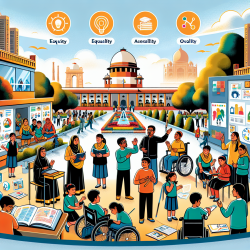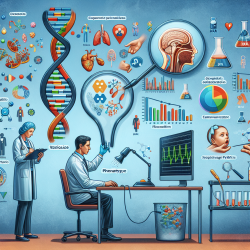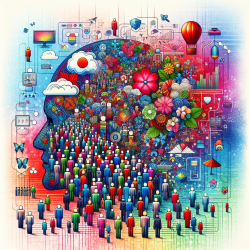Inclusive education is a global priority, but practical implementation often faces numerous challenges, especially in diverse and populous countries like India. The research article "Education of children with disabilities in New Delhi: When does exclusion occur?" provides critical insights into the barriers and potential solutions for inclusive education in urban India. Here are key takeaways for practitioners to enhance their skills and promote inclusive education:
Understanding the Barriers
The study identifies several barriers that prevent children with disabilities from accessing and remaining in the education system:
- Physical Barriers: Lack of accessible infrastructure and transportation options.
- Attitudinal Barriers: Negative perceptions and low expectations from teachers, parents, and peers.
- Socioeconomic Barriers: Poverty and low educational levels of household heads significantly impact access.
Implementing Early Assessment and Intervention
Early assessment is crucial for identifying and addressing learning difficulties before they become insurmountable. Practitioners should advocate for policies that mandate early childhood education and screening for disabilities. Early intervention can significantly improve educational outcomes for children with disabilities.
Teacher Training and Sensitization
Teachers play a pivotal role in the success of inclusive education. Comprehensive training programs should be implemented to equip teachers with the skills and knowledge needed to support diverse learners. Additionally, sensitization programs can help in changing negative attitudes and fostering an inclusive classroom environment.
Focus on Quality and Equity
Access to education is not enough; the quality of education must also be addressed. Practitioners should push for curricula that accommodate diverse learning needs and promote equity. This includes using adaptive teaching methods and providing necessary resources and support.
Addressing Socioeconomic Factors
Practitioners should work with policymakers to address the broader socioeconomic factors that affect educational access. This includes advocating for financial support for families of children with disabilities and ensuring that educational policies are inclusive and equitable.
Further Research and Data Collection
More research is needed to understand the specific needs and challenges faced by children with disabilities in different contexts. Practitioners should encourage and participate in research initiatives that aim to collect comprehensive data on educational outcomes and barriers.
Recommendations for Policy and Practice
Based on the findings of the study, here are some actionable recommendations:
- Implement early childhood education programs that include disability screening.
- Develop and mandate comprehensive teacher training programs focused on inclusive education.
- Advocate for policies that address the socioeconomic barriers to education.
- Promote research and data collection to inform policy and practice.
To read the original research paper, please follow this link:
Education of children with disabilities in New Delhi: When does exclusion occur? 









